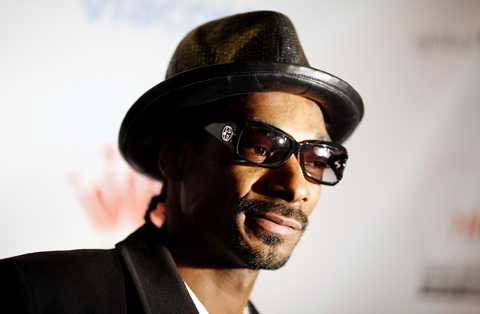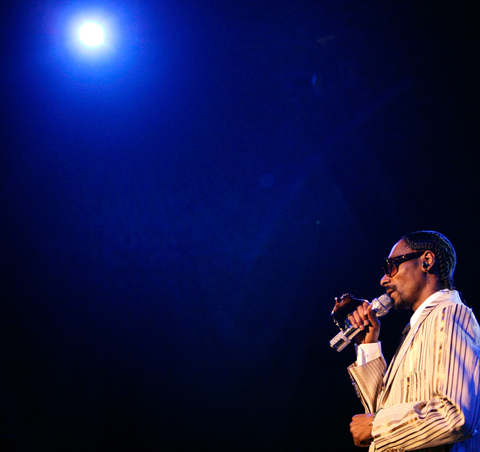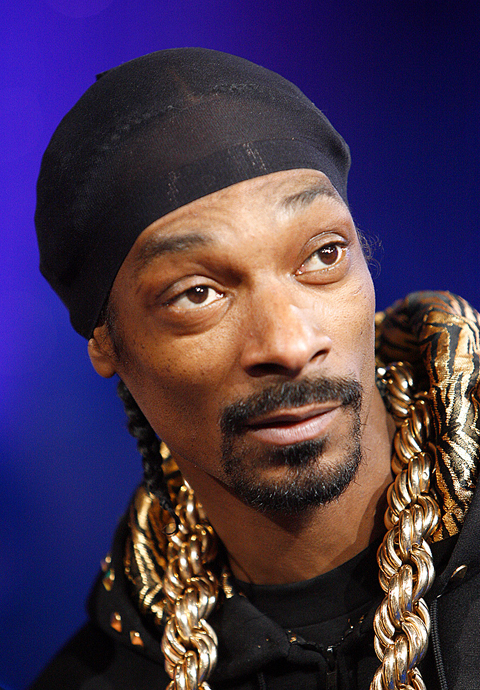The moment Snoop Dogg walks into the suite of The Grafton in West Hollywood, he sits down on the bed opposite a mirror and proceeds to stare at himself. It’s a fancy hotel room on the debauched Sunset Strip: I imagine all manner of interesting things have taken place in front of this mirror. But never the self-love reflected here by the 37-year old rapper and former pimp. Smoothing his pig-tailed hair, he answers every question to his reflection, to the point where I wonder if it’s an acting exercise this ex-Crips gang member picked up from Owen Wilson on the set of Starsky and Hutch (Snoop played Huggy Bear, one of his several forays into film).
Until recently, Snoop, who rose to fame in the 1990s as a protege of NWA’s Dr Dre, was most famous for smoking pot, for popularizing the slang suffix “izzle” and for run-ins with the law. When gangsta rap was at the center of arguments in favor of censorship, many focused on the misogyny of his record Doggystyle. When he moved, acrimoniously, from Death Row records to Master P’s No Limit label, he incorporated P’s Dirty South sound but stuck to the same themes with the top 5 single, Groupie Luv.
In 2004, he signed to Geffen and, produced by Pharrell Williams, saw Drop It Like It’s Hot go to No. 1. Having been cleared of a gang-related murder charge in 1993, it was small potatoes when last year following a fracas outside the British Airways first-class lounge that led to a night in jail, his visa request to enter the UK was rejected.

PHOTO :AP
Incredible as it may seem, now that reality TV is the order of the day, Snoop has rebranded himself as a family-friendly guy, starring in a reality show about himself called Snoop Dogg’s Father Hood, featuring his wife Shante and their children, on the E! cable channel.
“It’s a blessing,” he reflects to his reflection, “to have been in the rap game for so long and to remain so relevant, to remain talked about with the newest and the latest and the hottest, freshest.”
Some would dispute his assessment. The thing that makes hip-hop different from other genres is that credibility is often found in the level of your success, not the quality of your music. Unless you’re Afrika Bambaataa, your relevance is marked by sales more than by musical innovation. The music business is seen as a hustle, so putting out records is a start, but then you need to capitalize on it. (Jay-Z may be the best example: as well as scoring hit records, he runs a record label and a clothing line.) Snoop put out one record in the 1990s that was both catchy and unique, Gin and Juice, and from that he’s launched his own video games, porn DVDs, a soft drink called Pimp Juice, movie roles, and now the reality show. In that respect, he is a total success for working the hustle so well.

PHOTO :AP
“I earned the right to call my album Ego Trippin’,” he tells the mirror. “Nine records in 15 years, top 10 every time I come. I earned the right to do that. Fuck whoever don’t like it.”
His publicist has warned me to make his album the focus of my questions, but the truth is that he has very little to say about it. Fair enough, music is not necessarily any fun to deconstruct. His responses are near catatonic, with an edge that suggests if only he weren’t so bored by the questions they would be making him angry. But he comes to life when I raise the subject of Barack Obama’s recent speech on race.
“What did he say?” he asks, raising an eyebrow to himself, flirting with his own angular lines.

PHOTO :AP
“Well, he’s having to disassociate himself from his pastor, who was criticized for saying, essentially, that America is built on racism.”
“It is!” he screeches at the mirror.
I’m not quite sure where I’m supposed to be looking: it’s a bit like talking to someone with a wall eye. “Right, but because he wants to be president he still has to disavow this confidant of 25 years,” I say.
“Black America support him on that. By any means necessary. Get in that White House. Then once he get in, he can catch up to old relationships. ’Cos they looking for a loophole to make him not win.” He almost looks at me, but then seems to think better of it as he whispers: “The KKK gave Obama money.”
“Really?”
“YES.” Snoop has an interesting verbal mannerism of capitalizing words without putting any exclamation at the end. “They was one of his biggest supporters.”
“I’ve never heard that.”
“YES. Why wouldn’t they be? The media won’t tell you that. They don’t want you to know that. They just want you to know that this nigger befriended this other nigger who be threatening your values. But we all know all presidents lie to get into fucking office. That’s they job.”
Does he agree with the widely held sentiment that former US president Bill Clinton was the “first black president”?
“He was closest we gonna get to the first black president. He related to black needs and black values, black understanding and racism. He from Little Rock, Arkansas. That’s a black-dominated world. He was part of us. That’s why every day was happy when he was in office. It was just the funnest time in the world. Everything worked.”
If Obama were in the room, I get the sense Snoop would let him share the mirror. “In America’s eyes, that muthafucker’s gonna be the president ’cos [John] McCain can’t fuck with him. Hillary [Clinton] can’t fuck with him. He’s winning over white people, white ladies.”
I mention a recent survey that revealed older black women’s reluctance to vote for Obama because they have a maternal fear that, if elected, he would be assassinated. Snoop sits up straight. “It’s real! It’s true shit. That’s the White House. No niggers allowed!”
So what about US Secretary of State Condoleezza Rice? Snoop slouches. “They need us to manipulate and do the bad shit because we conversate and our color is friendly with other peoples. This color” — he traces a loving finger down his cheek — “is friendly with every country. That white color” — he points at me — “ain’t friendly. The white man be threatening the Indian. The white man be threatening the slaves. The white man be threatening the Australians.” (I think he is talking about atrocities against the Aboriginal people.) “That face ain’t to be trusted. That’s why Condoleezza does all the conversatin’ and all the chores around the world. Remember when Clinton was in office, he had the black dude move for him?” Vernon Jordan?
“Yeah, that nigger that covered up shit for him: ‘Say you never had sex with that woman ... .’”
I ask why it is that Snoop doesn’t address these strong political convictions in his music. “I feel it affect me, but I don’t need to be crying and shit on my records.”
Not like Mos Def or Talib Kweli, whose music is the medium, is the message. Snoop is bored again. So bored. I am riveted because I was sure, as a businessman, he would have stayed on family-friendly message. Isn’t he supposed to be just a regular family guy now?
“But I am. That’s what I always been. People in London always get information on me as far as when I go to jail and my criminal record. Negative things. They never hear about my football team, my wife, my kids, my standing in the community, the gang interventions that I do. They don’t give a fuck about it!”
He focuses very hard on his reflection as he does an impression of a news anchor announcement: “‘Today Snoop Dogg was arrested for ... .’ As opposed to” — and now his voice is sotto, even coy — “‘Snoop Dogg done something very nice in the community today.’”
He nods at his reflection in deference to his own nice doing, and I ask who he considers the most inspirational black leaders in the US today. “Minister Louis Farrakhan. Snoop Dogg.”
I laugh. He purses his lips and gives the mirror a look so deadly it tells me that accidentally laughing at Snoop is equivalent to accidentally laughing at a regular man during sex.
Since he’s brought up Farrakhan, often vilified for his anti-Semitic remarks, I ask if he can explain how blacks and Jews, who worked together so closely during the civil rights movement, now seem so far apart.
“That’s the way the system has designed it. When they seen us becoming family, becoming close, that’s when government and people behind the scenes created a negative inference between us. If the blacks and the Jews had stayed family then the blacks would have never suffered because the Jews would have showed us how to make money and keep it in the family.” Spoken like a true Farrakhan follower.
One of the most frustrating things about Snoop is that he and his pimpdom were already aberrations when they emerged. The majority of hip-hop voices at that time (groups like A Tribe Called Quest and Public Enemy) had been more socially progressive on everything, including attitudes to women, than the mainstream American culture of Playboy and the Hooters restaurant chain. But, as the industry went corporate and the record labels weeded out the non-pimp, non-gangsta acts and brought in artists who called women bitches and ho’s, the Snoop-ification was rapid and lucrative for everyone from the Dogg himself, to the companies peddling his porn and clothing lines.
I have worn scuffed Converse, boy jeans and a T-shirt to this interview because I didn’t want Snoop to look at me sexually. And yet I find myself asking the next question, when the publicist pops her head in to say “two more minutes.” I stare at him, staring at himself and it comes out like Tourette’s.
“What would be my market value, if you were still pimping?”
Snoop looks up, with interest, for the very first time. He looks at my face, my hair. He appears to do a sum in his head.
“Stand up real quick, let me see.”
And I do.
“Oh! You built nice! You built like a black girl! You been sitting on a fortune. You need the right person to represent you, get the connection. You could be in the US$4,000 range.”
Snoop was right. Us Jews do have all the money. All the time I had been wondering where mine was, when it was right behind me.
Taking women dressed in diamond collars and leads down the red carpet at awards shows has been labelled hip-hop behavior, when it’s really just recycled blaxploitation imagery and misogynist buffoonery — to say nothing of Snoop’s other confused political views. But he will do any dance and put on any persona, if that’s what he thinks will command the most attention. Recalling that, last year, Snoop was the first artist to release his track as a ringtone prior to a single, it occurs to me that he is actually the ultimate ho, being pimped out by the industry in a fantasy of hyper-sexualized criminality. And laughing all the way to the bizzle.

Nine Taiwanese nervously stand on an observation platform at Tokyo’s Haneda International Airport. It’s 9:20am on March 27, 1968, and they are awaiting the arrival of Liu Wen-ching (柳文卿), who is about to be deported back to Taiwan where he faces possible execution for his independence activities. As he is removed from a minibus, a tenth activist, Dai Tian-chao (戴天昭), jumps out of his hiding place and attacks the immigration officials — the nine other activists in tow — while urging Liu to make a run for it. But he’s pinned to the ground. Amid the commotion, Liu tries to

The slashing of the government’s proposed budget by the two China-aligned parties in the legislature, the Chinese Nationalist Party (KMT) and Taiwan People’s Party (TPP), has apparently resulted in blowback from the US. On the recent junket to US President Donald Trump’s inauguration, KMT legislators reported that they were confronted by US officials and congressmen angered at the cuts to the defense budget. The United Daily News (UDN), the longtime KMT party paper, now KMT-aligned media, responded to US anger by blaming the foreign media. Its regular column, the Cold Eye Collection (冷眼集), attacked the international media last month in

A pig’s head sits atop a shelf, tufts of blonde hair sprouting from its taut scalp. Opposite, its chalky, wrinkled heart glows red in a bubbling vat of liquid, locks of thick dark hair and teeth scattered below. A giant screen shows the pig draped in a hospital gown. Is it dead? A surgeon inserts human teeth implants, then hair implants — beautifying the horrifyingly human-like animal. Chang Chen-shen (張辰申) calls Incarnation Project: Deviation Lovers “a satirical self-criticism, a critique on the fact that throughout our lives we’ve been instilled with ideas and things that don’t belong to us.” Chang

Feb. 10 to Feb. 16 More than three decades after penning the iconic High Green Mountains (高山青), a frail Teng Yu-ping (鄧禹平) finally visited the verdant peaks and blue streams of Alishan described in the lyrics. Often mistaken as an indigenous folk song, it was actually created in 1949 by Chinese filmmakers while shooting a scene for the movie Happenings in Alishan (阿里山風雲) in Taipei’s Beitou District (北投), recounts director Chang Ying (張英) in the 1999 book, Chang Ying’s Contributions to Taiwanese Cinema and Theater (打鑼三響包得行: 張英對台灣影劇的貢獻). The team was meant to return to China after filming, but